Barrie Kosky’s production of The Threepenny Opera to open at the Adelaide Festival
The musical that inspired Cabaret and Babylon Berlin is really a ‘grubby little parable’ about lonely people in the city, says director Barrie Kosky.
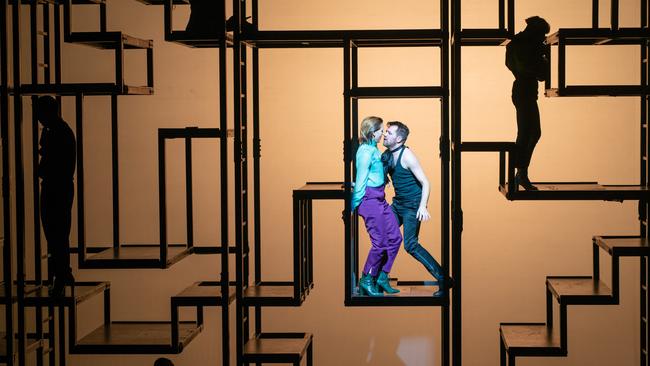
Barrie Kosky must have thought all his currywursts had come at once when the Berliner Ensemble invited him to direct The Threepenny Opera. The musical satire by Bertolt Brecht and Kurt Weill is one of the most celebrated pieces of the 20th century, a rogues’ gallery of thieves, killers, beggars and prostitutes. It had its premiere in 1928 at the Theater am Schiffbauerdamm, which since 1954 has been the home of Brecht’s theatre company, the Berliner Ensemble.
It’s the kind of piece, you’d think, that Kosky would have had in his repertoire for years. In fact, his Berliner Ensemble production, which opened in 2021, is his first. With it came the excitement of working with Weill’s irresistible tunes – Mack the Knife is only the most famous number of the score – and of sitting at the very desk Brecht used at his Berlin theatre.
“To be asked to direct The Threepenny Opera on the stage where the piece was premiered was really one of the great thrills of my life,” Kosky says. “They have still got Brecht’s original production desk in the theatre – that’s where all the directors work from. You know, little Barrie from Melbourne had to constantly pinch himself: ‘How did I get here?’.”
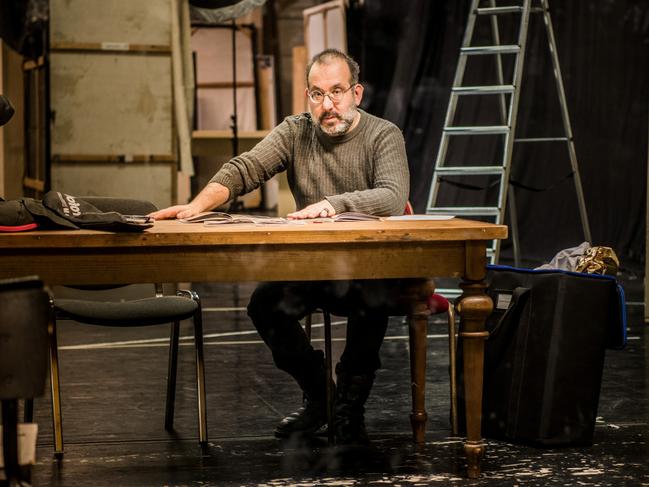
Kosky’s Threepenny Opera recently clocked 100 performances, having been staged in Edinburgh, Amsterdam and Rome as well as Berlin, and the show with the German cast is coming to the Adelaide Festival in March. He says the reason he has taken so long to direct a production is the difficulty of staging it. In other words, he didn’t want to make a mess of it.
“I didn’t know how to do it – the dramaturgy of the piece is quite tricky,” he says. “You have to get away from the Weimar Republic cliches. It’s not Babylon Berlin, it’s not Cabaret, it’s not Kander and Ebb. No Otto Dix, no George Grosz. People forget that Brecht is very funny – cruel, but funny.”
Kosky is speaking on a video call from Zurich, where he is directing The Merry Widow. He leans in towards the camera when he becomes animated, his face and black spectacles looming large on the receiving end. It’s a typically busy time for the director, who stepped down as intendant of the Komische Opera in Berlin in 2022 but remains there as guest director until the 2027-28 season. In October he inaugurated his new Ring Cycle for the Royal Opera in London with Das Rheingold. In The Netherlands, he is midway into a survey of Puccini’s operas and is soon to stage Il Trittico there.

One of his great legacies at the Komische has been his revival of the so-called jazz operettas that flourished in Berlin from the 1920s to the early 1930s. They include Ball im Savoy by Paul Abraham, which had its premiere in 1932, and Fruhlingssturme by Jaromir Weinberger, from early 1933. When the Nazis came to power that year, they condemned as degenerate musical works by Jewish composers, including Weill’s Threepenny Opera.
“It was banned during Nazi times because he was Jewish,” Kosky says. “But the premiere of The Threepenny Opera was in 1928 – so it already had a few years of fame – and then the piece spread around the world very quickly.
“It had a completely different destiny to most of the operettas that were forgotten. This piece was famous from when it had its premiere.”
For all the associations of The Threepenny Opera with the Weimar Republic and Berlin’s cultural boomtime of the late 1920s, the original source of the piece is actually English and dates from 200 years before.
The “play with music” is based on The Beggar’s Opera, a ballad opera by John Gay that was itself a parody of the craze for heroic Italian opera in London in the 18th century. Despite the title, The Threepenny Opera is more anti-opera than coloratura showcase. The underworld characters, the London setting, the story and social satire remain in outline in The Threepenny Opera, adapted from the English by Elisabeth Hauptmann, and from whose translation Brecht wrote the play and lyrics.
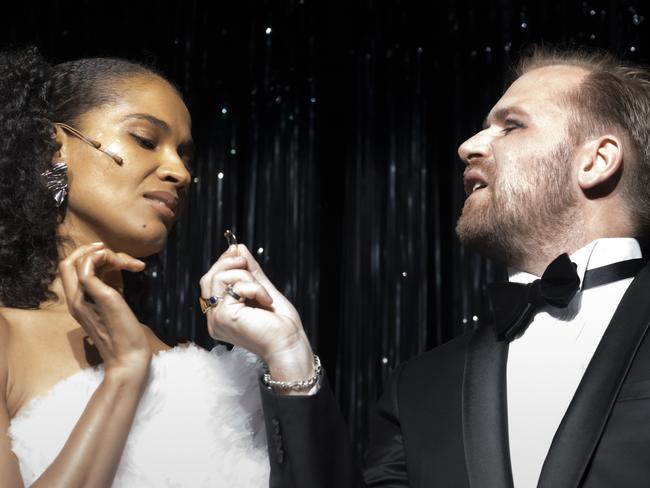
The play overturns the operatic conventions of heroic action and just reward, cynically repaying the serial killer Macheath not with the gallows, but with a royal pardon, a castle and a title.
“It’s a parody of an 18th-century opera, like The Beggar’s Opera, but it’s more savage, because the psychopath triumphs, he wins in the end,” Kosky says. “You could look at the narcissism of our own age, because Mackie Messer is one of the great narcissists of the stage, you could talk about how narcissism is unfortunately one of the pillars of Western society now, through social media.”
As he explains, the tension between Brecht’s words and Weill’s music gives The Threepenny Opera its darkly glittering allure.
“Brecht’s texts are savage and bitter, cynical, like a knife, and Kurt Weill’s music is going in the other direction – it’s full of yearning and sadness and melancholy and regret and loss and loneliness,” he says.
You think of numbers such as the Ballad of Sexual Dependency, and Pirate Jenny, the barmaid who sings of a pirate ship that will blow the town to smithereens.
“That’s what makes the piece interesting: Brecht is trying to make us think, and Weill is constantly making us feel,” Kosky continues. “Every song is a winner. And this tension between what Kurt Weill is doing through the music, emotionally, and what Brecht is trying to manipulate through the intellectual text creates that moment of tension, creates the piece. It’s very interesting, but very hard to do on stage.”
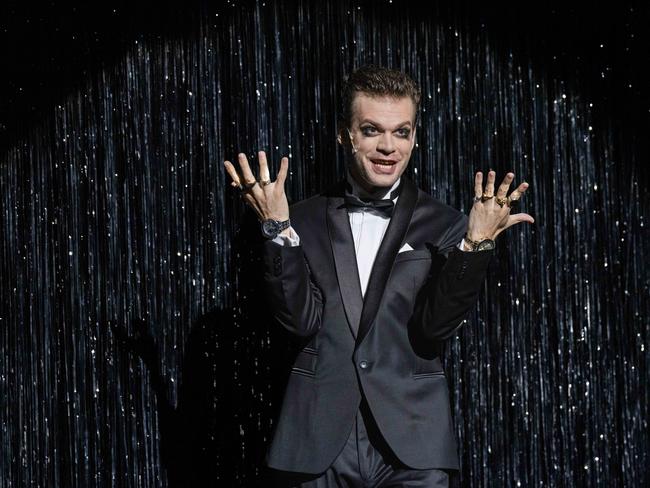
Another complicating factor is that Brecht retrospectively changed his ideas about The Threepenny Opera, including in his 1934 prose work, Threepenny Novel. Weill regarded The Threepenny Opera as a “farce with music”, Kosky says, a comment that reportedly angered Brecht, who had rather more serious intentions. He wanted it to be an angry critique of capitalism, a kind of theatrical expose of the life of the urban poor and criminal class.
“After the war, he reinvented the piece as a sort of early communist, anti-capitalist critique, which is not really what it was in 1928,” Kosky says. “Brecht had a habit of self-mythologising, and the success of The Threepenny Opera didn’t fit his post-war identity, so he tended to tell some big white lies about it.
“Even though Brecht’s song lyrics are sensational, some of the dialogue is a bit creaky and you have to cut and adapt it – we’ve cut about a third of the text. But the piece became famous because people were gobsmacked by the music – that’s what people whistled all through the streets of Berlin for months after the premiere. That’s why the recordings became so successful, and Weill and Brecht made a lot of money from it, Brecht in particular – being a good, true Communist, he made sure he got (the largest share of) the royalties.”
Kosky, who was director of the Adelaide Festival in 1996, is unable to come out for the performances of The Threepenny Opera. But he is sending to Australia his cast from the Berliner Ensemble. It includes Tilo Nest as Peachum, Constanze Becker as Mrs Peachum, Cynthia Micas as their daughter, Polly, and Gabriel Schneider as her dangerously attractive husband, Macheath (Mack the Knife). The performance, in German, takes place on what looks like an enormous scaffolding rig, designed by Rebecca Ringst.
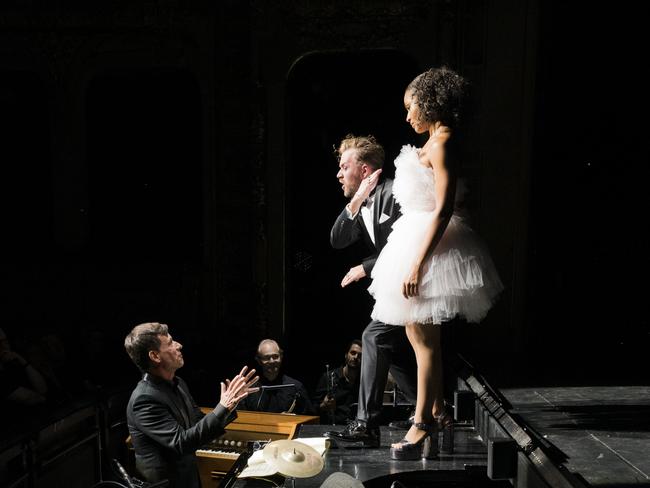
“The set is a labyrinth – a maze, an experiment,” Kosky says. “It’s a city of night, it’s a map, it’s a place where you get lost – the actors have to climb through it. No one can actually stand up straight in the set. I wanted to make it a world where no one felt entirely right. They scuttle around it like rats in the sewer, which is essentially what they are.”
The performances also feature the orchestra from the Berliner Ensemble, led by Adam Benzwi, conducting Weill’s original score. The composer deliberately had the musicians doubling and tripling on other instruments to produce a rough-around-the-edges sound. It includes piano, harmonium, saxophones and trombones, bass, drums, guitar and banjo, among other instruments.
“There are all sorts of musical versions of it – some with rock bands, some with three instruments, some with a big orchestra,” Kosky says.
“We have done the original 1928 orchestration, which is the best, it’s the most authentic-sounding. I’ve heard 20 different versions of it, and I have no problems with people adapting the music. However, I think that with what Kurt Weill wanted to do with the piece, it sounds better with that smaller, slightly out-of-tune, grubby, less-than-perfect orchestra that he wrote for.”
Brecht’s friend Walter Benjamin, reporting a conversation with the dramatist, noted a Brechtian maxim: “Do not build on the good old days, but on the bad new ones.” How does Kosky think The Threepenny Opera speaks to the world almost a century after its Berlin premiere?
“The piece is satirical, no doubt about it, just like The Beggar’s Opera was satirical, but it has a light touch,” he says. “It’s a grubby little parable about people in the city. In a way it’s an elegy to the loneliness of the city. It’s about love, it’s about money, it’s about love for sale, it’s about the manipulation of love, it’s about the connection of power and money.”
The Threepenny Opera is at Her Majesty’s Theatre, Adelaide, March 6-10.
